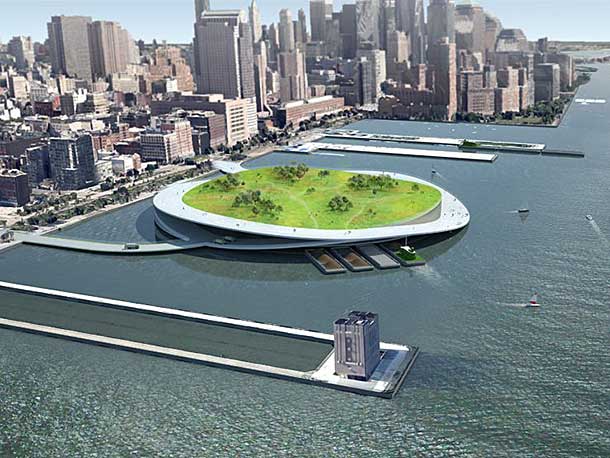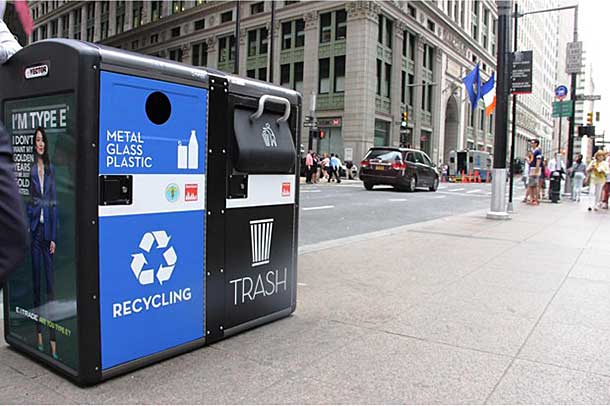
We’ve seen a lot of new exciting green technologies over the past few decades, but there is one that has gone mostly unnoticed: city sanitation. New innovations in trash collection and processing are happening and in a few years sanitation as you know it might be totally different. High tech trash cans, smart recycle bins, and the conversion of trash to usable energy is changing the face of city sanitation. Get ready to start seeing some of these sanitation innovations coming to a city near you.
Smarter Trash Cans
Instead of serving as a passive container for holding garbage, the trash can is becoming an active participant in city sanitation. Bigbelly trash cans throughout New York City are now equipped with wifi, and each can supplies enough bandwidth to support a small business (50 to 75 megabits per second). While helping people on the streets of NYC stay connected, Bigbelly trash cans make sanitation efforts more efficient. Each contains a chip capable of detecting garbage levels and odor so sanitation workers can wirelessly monitor and collect bins based on their need to be emptied.
Bigbelly is not the only brand trying to revolutionize trash collection. BlueCity is bringing advances in crowdsourcing to trash cans to improve city collection methods. The startup equips cans with a low Bluetooth signal that is picked up by apps downloaded to the phones of willing participants. The phone communicates information about the can’s fullness to a data collection system where the information can be used to alert sanitation workers individually or analyzed to set up better collection routes across a city.
Smarter Recycling Bins
Imagine a recycling bin that can tell you exactly where and how to recycle each item you put in it. To make this a reality, researchers are finding ways to combine RFID tagging with recyclable materials. First, manufacturers will have to cooperate by tagging their products or containers, then consumers will have to use bins equipped with scanners. All the data from the scanner can be collected and even used for incentive programs where consumers are paid for each piece of waste properly recycled.
Vacuum Systems
Rather than have trucks driving around, imagine an underground system where your trash is whisked away and brought to a processing place through a system of tubes. Pneumatic trash removal systems like these already exist and help keep places like Disney World or Barcelona free from mounds of garbage bags. Pneumatic tubes may be the answer to the sanitation problems facing larger cities like New York.
The Closed Loop project proposes making pneumatic waste removal a part of Manhattan’s High Line park so that surrounding buildings can send compostables and other trash down vacuum tubes to a central collection center for sorting. This would make local waste management efforts more realistic while cutting down on the number of garbage trucks in use and the carbon emissions they create.
From Trash to Energy
Smart recycling bins and pneumatic composting systems will drastically decrease the amount of garbage reaching landfills in the future, but in the meantime overfull dump sites are creating significant emissions problems. In 2013, 18% of human-related methane emissions in the U.S. were caused by landfill gases, but it doesn’t have to be this way. Sweden’s energy initiatives are a great example of how methane-producing landfill waste can be converted into usable energy. Only 1% of waste in Sweden ends up in landfills and what isn’t recycled is largely turned into energy to heat homes.

The process of gasification heats waste until clean gases are emitted. This cuts down on the use of fossil fuels while reducing emissions from rotting waste. Although there is some question about potential pollution caused by gasification, the energy expended on this process is still far less harmful than the effects of methane released from trash decomposing in landfills. The results of gasification can be used in the same manner as natural gases or energy derived from fossil fuels.
Sanitation Nation
City sanitation may have a brighter future than we think. With advances in technology transforming everything from landfill usage to the recycling bins in our homes, we should look forward to a new way of keeping our cities clean. Today, we can do our part by recycling and properly disposing of our trash while we wait for the future of city sanitation to become the present.
About The Author
Dominick A. Farina owns Trashcans Unlimited, a leading supplier of trashcans and recycling bins.